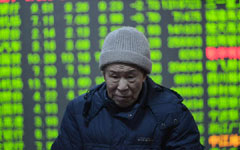Prices of some commercial properties fell sharply in selected cities in China; it is rumored that banks have tightened loans for real estate development and some property bosses, who used to be upbeat about the sector, are starting to become more cautious.
Is China's real estate sector facing a chill?
The National Bureau of Statistics (NBS) offers some clue. It said that out of 70 major Chinese cities, 69 have seen their new home prices rise year-on-year in January. But on a month-on-month basis, six cities have seen their prices fall.
|
 |
|
 |
Some property developers in the eastern cities of Hangzhou and Changzhou have reportedly cut home prices by about 30 percent in past weeks to boost sales.
And although a major commercial bank reportedly denied that it has stopped lending to developers, it is an open secret that it has become increasingly difficult for developers to secure loans.
Reflecting that market uncertainty, the domestic A-share market tumbled on Monday, primarily due to the sell-off of real estate shares thanks to the rumor of tightened bank loans for developers.
No doubt the sector is facing a difficult time. If sales continue to stall, more cash-thirsty developers may opt to cut prices, ultimately leading to a chain effect that risk triggering a widespread crisis.
For now, however, an all-round crisis still seems quite remote, although the possibility is high for price corrections of varying levels in some places.
For authorities, it is crucial to make the banking sector conscious of its risk exposure and become more risk-aversive, so that the upcoming home price corrections would not spill over to substantially affect the balance sheet of the banks.
It will be a severe challenge for both banks and regulators. But it is a must if China wants to prevent the property downturn from dragging down the overall economic growth.
